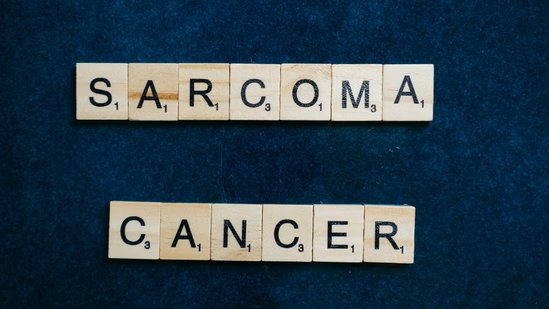What are sarcomas? Sarcomas are cancers that develop in the connective tissues of the body, such as bones, fat, nerves, and blood vessels. There are different subtypes of sarcomas, making diagnosis and treatment challenging. In an interview with HT Lifestyle, Dr Sredharan M, consultant, surgical oncology, Manipal Hospital, Goa, explained everything you should know about sarcomas.
‘Sarcomas account for less than 1% of all cancers’
He said, “Sarcomas are a unique and rare grouping of cancers that begin in body connective tissues, which include muscle, fat, blood vessels, nerves, and bone. Sarcomas are not to be confused with other cancers that arise from organs (such as breasts, lungs, or colon) because they arise from tissues that connect and support the body’s components. Because sarcomas account for less than 1 percent of all cancers, most people are not aware of them until they know someone who has been diagnosed.”
He added, “While sarcomas are rare, awareness is key. Any new, persistent swelling or lump, especially one that grows, should be checked by a doctor. Timely diagnosis translates into positive outcomes. New research continually fosters hope and treatments for patients diagnosed with this uncommon but serious form of cancer.”
Types of sarcomas, causes, risk factors
Dr Sredharan said there are two types of sarcomas:
⦿ Soft tissue sarcomas, which arise from muscles, fat, blood vessels, or other extra-soft tissues.
⦿ Bone sarcomas, which arise from bone.
He shared that diagnosing sarcomas can be challenging due to their rarity and similarity to other conditions, and explained, “Sarcomas can occur anywhere in the body, though common sites include the arms, legs, abdomen, and chest. One of the challenges with sarcoma is that it usually develops silently and doesn’t cause any symptoms. In the early stages, it appears as a painless lump or swelling, which many people ignore. Over time, the lump gradually grows. Pain is usually a late symptom due to pressing on the nerves or organs.”
According to Dr Sredharan, the exact cause of most sarcomas is unknown. “Some identified risk factors are previous radiation therapy to treat other cancers, genetic conditions such as neurofibromatosis or Li-Fraumeni syndrome, and exposure to chemicals like certain herbicides or industrial toxins. Unlike other carcinomas, sarcomas cannot be linked to lifestyle issues such as smoking or alcohol use. Most sarcomas that occur have been documented in people with no known risk factors,” he said.
He added, “When a doctor thinks you may have sarcoma, they will usually perform imaging studies to evaluate the extent of the disease (MRI/CT scan), and a biopsy will be required to confirm the diagnosis. Treatment depends on the size, location, and stage of the tumour.”
Treatment for sarcomas
Dr Sredharan said that the treatment typically involves:
⦿ Surgery to completely excise the tumour (this is the primary treatment option)
⦿ A radiotherapy to address residual cancer cells and, if needed, to shrink the initial size of the tumour, i.e, add more time to survival under remission. (Arising early on in the process of disease)
⦿ Chemotherapy in some types or advanced cases
He added, “Because of advancements in medical science, many people with sarcoma can be cured, especially when detected at an early stage. Even in advanced cases, modern therapies may extend life and the quality of life.”































